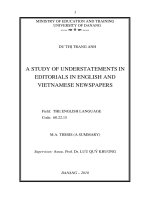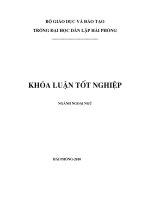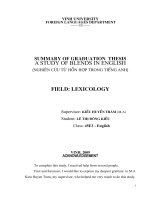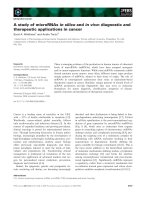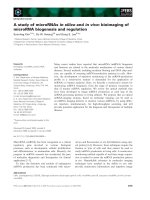A STUDY OF METAPHOR IN ENGLISH
Bạn đang xem bản rút gọn của tài liệu. Xem và tải ngay bản đầy đủ của tài liệu tại đây (89.48 KB, 15 trang )
Vietnam national university, Hanoi
College of foreign languages
Department of postgraduate studies
Semantics
Final assignment
A STUDY OF METAPHOR
IN ENGLISH
Lecturer
: Dr. Hà Cẩm Tâm
Student
: Phạm Thị Tuyết Mai
Group
: English 17C
Date of birth: 07/06/1985
Hanoi, 2010
Table of content
Introduction...............................................................................................3
Development..............................................................................................4
1. What is metaphor?...............................................................................4
2. How are metaphor and simile different?.............................................5
3. What is metaphor based on?................................................................6
3.1. Similarity of shape.......................................................................6
3.2. Similarity of size..........................................................................6
3.3. Similarity of position....................................................................7
3.4. Similarity of movement................................................................7
3.5. Similarity of function...................................................................7
3.6. Similarity of color........................................................................8
3.7. Similarity of behavior and character............................................8
3.8. Similarity of sound.......................................................................8
4. Classification of metaphor...................................................................9
4.1. Living metaphor...........................................................................9
4.2. Fade metaphor............................................................................10
4.3. Dead metaphor...........................................................................10
Conclusion................................................................................................12
Appendix..................................................................................................13
References................................................................................................15
2
Introduction
Metaphor, an aspect of semantics, has long been a great concern of
researchers and learners of English. A good understanding of how metaphor is
used in everyday language is not only important for students of English to
increase our vocabulary, but also to understand new and original metaphor when
we hear or speak them.
Importantly, metaphor helps learners see the interest, the beauty as well as
the culture color of language which enables them to use and understand
correctly and clearly.
With this study on metaphor in English, I hope that learners will have a
general understanding of metaphor and at the same time, get some common
metaphors for themselves.
3
Development
1. What is metaphor?
Theoretically, there are a lot of different ways to define what metaphor is.
A metaphor is a figure of speech that says that one thing is another different
thing. This allows us to use fewer words and forces the reader or listener to find
the similarities. The simplest form of metaphor is: "The [first thing] is a [second
thing]."
According to Oxford Advance Learner’s dictionary: metaphor is a word or
phrase used to describe somebody or something else, in a way that is different
from its normal use, in order to show that two things have the same qualities and
to make the description more powerful
Or according to Lakoff, G. 1987, a metaphor is the expression of an
understanding of one concept in terms of another concept, where there is some
similarity or correlation between the two. A metaphor is the understanding itself
of one concept in terms of another.
For example; "Her home was a prison." In this sentence, we understand
immediately that her home had some of the characteristics of a prison. Mainly,
we imagine, she could not leave her home. She was trapped inside, perhaps her
husband forced her to stay at home, and perhaps she was afraid of the outside or
because of other reasons. And with five simple words we understand a lot about
her environment, how she felt and how she behaved. In this sentence, "prison" is
a metaphor.
Here are further examples of metaphor:
4
Metaphor example
Metaphorical sense
I'm not an angel, but I exemplary person
wouldn't behave like
that.
Original sense
a spiritual being believed to
be a messenger of God
America is a melting place where different a container in which metals
pot
peoples, styles and or other materials are melted
cultures are mixed and mixed
together
John is a real pig greedy person
when he eats.
My father is a rock
a four-legged animal kept for
meat (pork)
very strong or reliable a hard, mineral
person
made of stone
material
How could she marry traitor
a snake like that!
a long, limbless reptile (eg:
cobra, python, viper)
The policeman let him warning
off with a yellow
card.
(in soccer) a yellow card that
the referee shows to players
when cautioning them
2. How are metaphor and simile different?
Some people still confuse between metaphor and simile, because they are
similar in nature. With this part, I will make it clear how they are distinguished.
Both similes and metaphors link one thing to another. A simile usually
uses "as" or "like". A metaphor is a condensed simile, a shortcut to meaning,
which omits "as" or "like." A metaphor creates a relationship directly and leaves
more to the imagination.
With simile A is like B. With metaphor A is B.
According to J.D. Casnig, there is a short list of distinguishing
characteristics:
5
"A metaphor is an equation where a simile is an approximation."
"A metaphor can always be greatly extended, while a simile quickly
reaches its limits."
"The words like or as are widely known hallmarks of the simile - but there
are so many faux similes bearing these hallmarks that further appraisal is always
needed."
"A metaphor dies of exhaustion; a simile just gets more and more tired."
For example,
Simile: You are like the sun
He eats like a pig.
Metaphor: You are my sunshine
He is a pig
3. What is metaphor based on?
Metaphor is the transference of names based on the association of
similarity. In other words metaphor is a hidden comparison.
3.1. Similarity of shape.
Neck of the bottle
Mouth of the cave
Truong (1993:80)
In these examples, the “neck” is not a neck-part of the human body, but it
is the narrow part at the top of the bottle, also the word “mouth” in the last one
is a part of the body that is small and round. Mouth is also used as a metaphor to
refer the entrance of a cave.
3.2. Similarity of size
Their daughter is quite plump but their son is positively elephantine
6
The image of “elephantine” is used metaphorically to make hidden
comparison with a big person.
3.3. Similarity of position
The foot of a mountain
The heart of the country
Truong (1993:79)
Such expression as “foot of the mountain” is described as a similarity of
position “foot” is the lowest part of the body and it is used metaphorically to
refer to the foot mountain, the metaphor is stimulated by the identification of the
mountain. Similarly, “heart” is used metaphorically because it is an important
part of the body and in the center position.
3.4. Similarity of movement
The river snaked away into the distance
The verb “snake” is used as a metaphor based on the identification of
movement.
They had to worm their way through the narrow tunnel
The image of “worm” is an animal with a soft rounded or flattened body.
It is put in the real context with function as a verb to compare with a twisting
movement of a person like a worm.
3.5. Similarity of function
Basing on the similarity of function, these examples:
Key to the mystery
Head of the class
Truong (1993:80)
We easily see that “key”, “head” and in these cases are not a key to open
the lock, not head as a part of the body, in fact metaphorical meanings in these
7
examples are applied to any obstructing, and this transference of meaning is
based on some common features to refer to similarity of function.
3.6. Similarity of color
An orange light
English – Vietnamese –Dictionary (1993:1216)
The word “orange” is a kind of fruit and it is as a metaphor to refer to the
lights that has orange color. Therefore, the metaphorical expressions are based
on the identification of color.
3.7. Similarity of behavior and character
He is a fox
He is an Othello
The word “fox” here is a name of animal that indicates a big animal
which is very wise and cunning. Fox is used metaphorically with the negative
meaning to refer to a person cunning character or if we say “he is an Othello”, it
refers to a person who is very jealous, that are used as metaphor based on the
similarity of character and behavior.
3.8. Similarity of sound
He roared with his children
The verb “roar” is the sound made by lion or tiger people say that “the
lion roared”, in above example “roar” does not have this meaning, but it is used
metaphorically to refer to a very angry father who sounds loudly.
However, there are a lot of metaphors not based on the similarity, which
are hard to define and requires deep studying.
E.g.
You are washing my time
The dishwasher can save you time
I have invested a lot of time in the study
8
Clearly, there is no objective inherent similarity between time and a
commodity. But what is basis for the metaphor or brings these two concepts
together is the perception, based in part on culture and in part on feeling that all
human beings share. It is advisable to take two following examples for clearer
illustration
E.g.
She tried to avoid breaking his heart (hurt feeling)
I am feeling down (feel sad)
These two metaphors are resulted from the transference of space relation
upon psychological and mental notion, i.e. the relation between the concrete and
abstract.
On the whole, the similarities on which metaphor are based on so various
or sometimes are not clear-cut or present in metaphors.
4. Classification of metaphor.
Metaphor can be classified into three main types: living metaphor, fade
metaphor and dead metaphor
4.1. Living metaphor
Living metaphor that can be called active metaphor is one which
relatively new and has not become part of everyday linguistic usage. It is created
and used by individuals. Living metaphor, according to Hoang Tat Truong
(1993:81) is "When a word has an unusual metaphorical sense or the metaphor
is created and used by an individual".
E.g.
You are my sun
Perelman (1999:88)
In above example, the "sun" is used metaphorically to refer to a person
whom you respect or admire for whatever he has done for you. This is the result
9
from an individual and called a living metaphor.
As for this type of metaphor, the addressee can recognize them easily as
they are new and very impressive. Also, living metaphor are often created or
used by individual, poets and writers.
4.2. Fade metaphor
According to Hoang Tat Truong (1993:81) "fade (trite) metaphor is one
that has lost its freshness due to long and traditional use". And it is necessary to
note that the meanings of faded metaphor are registered in dictionaries since
they are of common use. We can take the following metaphor for example:
E.g.
Her voice is sweet
She is a snack
Truong (1993:81)
Their word "sweet" is used as metaphor to refer to a person who has a
very persuasive and skillful voice. And the word "Snack" in the second one is
also used metaphorically to express a person (she): dangerous character.
Faded metaphors have lost the freshness, vigor and emotional associations
they must have had. Presently, they are sleeping and half dead metaphors which
are only aroused in special circumstances. Many metaphors have become clichés
of as "stand shoulder to shoulder with" or keep one's head above water, as they
now lose the emotional associations that once went with them.
4.3. Dead metaphor
According to Hoang Tat Truong (1993:81) "Dead metaphor is a metaphor
which is no longer felt as a metaphor because the direct meaning of the word has
been completely lost". In other words, because dead metaphors have a
conventional meaning that differs from the original, they can be understood
without knowing their earlier connotation
We can look at following example for a highlight.
10
To ponder
In the former word, "To ponder" originally mean "to weight" but now
only means "to mediate/ to think or to consider carefully"
There are many examples of dead metaphors in the English language. A
brief list of examples is given below.
head teacher
forerunner
to run for office
to lose face
to lend a hand
pilot -- originally meant the rudder of a boat.
flair -- originally meant a sweet smell.
a computer mouse
seeds of doubt
world wide web
turn-on
flared jeans
he ploughed through the car at traffic lights
foothills or the foot of a mountain
branches of government
kidney beans
Hence, we can say that dead metaphors are only used with their indirect or
figurative meaning but their direct or literal meanings are completely lost. On
the whole, each type of metaphors can bring a different degree of metaphorical
sense to the addressee ranging from the living, faded and to the dead metaphor.
11
Conclusion
Metaphor is never a simple matter to master a language is always dynamic
and especially a lot of metaphors require a good background in literature. For
example, we can never understand what "He's a Othello" if we have not read
The Tragedy of Othello by William Shakespeare and English people take the
image of “Othello” a well- known character in the play of Shakespeare to refer
to a jealous person. Therefore, in order to know then use metaphors correctly, it
is essential to read much and research much.
This study aims at giving the readers an overview of metaphor in English,
accompanied with explanation of examples with a view to help readers clearly
see the ground that metaphor is based on. Also, they can distinguish between
different types of metaphor. At the same time, they may no longer confuse
metaphor with simile. And the most important of all, through the given examples
and the appendix, the readers can get some metaphor for themselves.
12
Appendix
Examples of metaphors
A heart of stone
He has the heart of a lion
You are the sun in my sky
You are the light in my life
She is my East and my West, my compass.
You had better pull your socks up
Life is a mere dream, a fleeting shadow on a cloudy day.
Love is a lemon - either bitter of sweet
Drowning in the sea
Jumping for joy
Rolling in dough
Apple of my eye
It is raining cats and dogs
Love is a fragile flower opening to the warmth of Spring
Information travels faster in this modern age as our days start crawling away.
Life has a tendency to come back and bite you in the ass.
A riverboat shall be my horse.
A light in a sea of darkness.
Strength and dignity are her clothing.
A laugh in a sea of sadness.
The noise is music to my ears
He swam in the sea of diamonds
His belt was a snake curling around his waist
Love is a camera, full of memories.
13
She ran like the Wind
Love is a growing garland.
Your friendship is the picture to my frame
Authority is a chair, it needs legs to stand up.
Once your hearts been broken it grows back bigger.
His hair is a white snowflake and his hair is a messy haystack
You are the expression of my heart. You care for me and love me all the time.
I'm Heartbroken
The pidgeons fountained into the air
His hair was bone white
He tried to help but his legs were rubber
It's raining men
Kicked the bucket
The sea is a hungry dog.
She is a dog when she eats
He has a voice of a wolf.
Crocodiles' teeth are white daggers.
Apple of my heart
A roundabout is a turtle shell.
Fire is day, when it goes out it's night
School is a gateway to adulthood
He slithered into town quietly so no one would notice when he dug his fangs in
and slowly poisoned their minds.
Leaping with laughter
14
References
Michael Mc Carthy Felicity O’ Dell 1995. English vocabulary in use.
Pawelec, Andrzej. "The Death of Metaphor" (PDF).
Thoa, N. Y. T. (2005) Assignment on Language and Culture in Contact. Vietnam
National University- Hanoi.
Truong, H T, 1993 Basic English Lexicology. National University College of
Foreign language.
/>
Retrieved
2009-12-08.
/> /> /> />m
15

